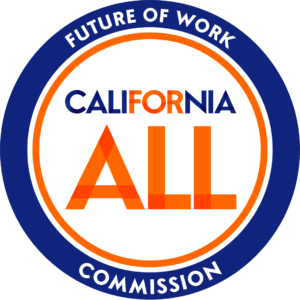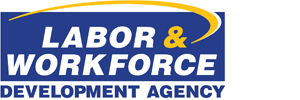
FOR IMMEDIATE RELEASE
Colton.Stadtmiller@labor.ca.gov
March 2, 2021
California’s Future of Work Commission
Issues Final Report Calling for New Social Compact
Challenges further exacerbated and brought to light by the COVID-19 crisis
Report details five priority recommendations for California
Sacramento, CA – California’s Future of Work Commission, a diverse cross-section of prominent leaders from technology, labor, business, education and other sectors, today presented its final report to Governor Gavin Newsom. Tasked with making recommendations to help the state create inclusive, long-term economic growth – and address the inequities further exposed by the COVID-19 pandemic and ensuing recession – the Commission called for the creation of a new Social Compact for work and workers in California by 2030.
“The Commission has worked intensively over the last 18 months to assess the challenges related to the present and future of work in California, identify areas of focus, and develop recommendations for action,” said Commission co-chairs Mary Kay Henry and James Manyika. “At the same time, the challenges we all faced in 2020 both fast-tracked the trends shaping the future of work and shifted predictions to current reality. California stands as the state that creates and safeguards the future. We need renewed commitment and action from all stakeholders coming together if we are to do both for work and workers in California.”
Prior to the COVID-19 pandemic, jobs in major industries and occupations were expected to face displacement by 2030, due to automation, sectoral shifts in the economy, and other trends. In anticipation of these coming changes, Gov. Newsom signed an executive order creating the Commission on May 1, 2019. The order states, “The Future of Work Commission’s primary mission shall be to study, understand, analyze, and make recommendations regarding the kinds of jobs Californians could have in the decades to come; the impact of technology on work, workers, employers, jobs and society; methods of promoting better job quality, wages, and working conditions through technology; modernizing worker safety net protections; and the best way to preserve good jobs, ready the workforce for the jobs of the future through lifelong learning, and ensure shared prosperity for all.”
“I want to thank the Commission for their tireless work, particularly as COVID-19 and the pandemic-induced recession shifted the landscape under their feet,” said Governor Newsom. “Events of the past year have amplified and accelerated existing trends, including the inequality of wages, income and wealth. This report sets forth both findings and recommendations that will help us address these challenges.”
The Newsom Administration is already investing in many of the recommended solutions outlined in the report, including growing clean tech jobs, increasing undergraduate degrees in entrepreneurship, raising wages and connecting workforce training and apprenticeships to growing industries and the jobs of the future.
Governor Newsom added: “California’s diverse and immutable assets – unparalleled innovation, the diversity of our people, our world-class higher-education system, our small business and a history of leadership and strong protection for workers and the climate – can be leveraged to make the state a place where workers thrive. But we’ll need all of our stakeholders to engage. By working together, California can model a new Social Compact for work and workers that can set a trajectory for the nation.”
To this end, the Commission lists five key recommendations, each with bold “moonshot” goals over the next 10 years, in the new Social Compact, which includes:
- Ensure there are jobs for everyone who wants to work: Facing high levels of unemployment and underemployment amidst the COVID-19 pandemic, and for those people and regions that never fully recovered from the last recession, job creation, job readiness, and job access will be critical to California over the coming years.
- Eliminate working poverty: Nearly 45 percent of the approximately 7 million Californians in poverty reported living in a family with at least one family member working full time. These workers earn wages below the eligibility thresholds of essential safety net programs, and they rely on these programs to make ends meet. Working poverty is highest in the service sector and in work-enabling sectors like care work.
- Creating a 21st century worker benefits model and safety net: Social safety nets must adapt to meet the needs of the labor market today and in the future, given modern challenges such as increasing income volatility, expanding and evolving forms of work and work arrangements, aging populations, a growing number of working parents, and workforce disruptions caused by automation, public health crises, and other challenges.
- Raising the standard and share of quality jobs: Currently, less than half of California workers report being in a quality job. Even though overall employment was strong prior to the COVID-19 pandemic, workers faced a labor market paradox: declining unemployment rates coupled with weak wage growth, resulting in a crisis of declining job quality.
- Future-proofing California with jobs and skills to prepare for technology, climate, and other shocks: With ongoing economic and technological transformations, as well as future unanticipated shocks, California workers must be supported in accessing future and quality jobs, in changing occupations, and in building new skills to be resilient through the future.
It will take the ingenuity, commitment, and involvement of all stakeholders in California in order to achieve the five bold goals proposed by the Commission. The Commission has proposed an initial set of ideas towards achieving these goals but invites all stakeholders to add and build on these – it will take everyone.
On March 3, Commission co-chairs, Mary Kay Henry and James Manyika, and California’s Labor Secretary, Julie A. Su will present the Commission’s findings during the Aspen Institute’s Opportunity in America, an event series hosted by the Economic Opportunities Program. The discussion is entitled, “California’s Plans for the Future of Work, Workers, and a Renewed Social Compact.” To learn more, click here.
###
